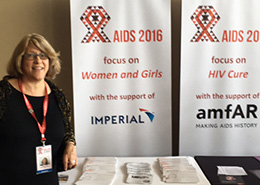Hopeful for the End of AIDS
School-based health education programs play an essential role in preventing the spread of HIV and AIDS—and they should be expanded, says EDC’s Ronnie Lovich.
“Building the capacity of educators to deliver sexuality education helps to prepare young people for relationships and decisions they will have to make in life,” says Lovich, the technical director of EDC’s international health programs. “It also creates an opportunity to look critically at the way gender dynamics influence the ability of young people to protect themselves.”
Lovich recently met with health practitioners and public health experts from around the world at the 2016 International AIDS Conference in Durban, South Africa. Improving the care for young people living with HIV, strengthening health systems, and ending parent-to-child transmission were all high-priority areas of discussion at the conference.
Lovich believes that fostering supportive environments in schools helps to build knowledge and life skills—benefiting both educators and learners. She points to EDC’s work in Botswana and Liberia as evidence of the strength of this approach.
In Durban, Lovich also appreciated the actions taken by people to advocate for school-based health programs. During one plenary session, a group of young activists called for South Africa’s Departments of Health and Education to respond to the needs of girls who miss school monthly when menstruating and to make comprehensive sexuality education and youth friendly services available to young people. Lovich notes that their demands were met with thunderous applause.
“There are many reasons to feel hopeful,” she says. “The voices of young people are being heard. Beyond being recipients of information and care, young people must be a major force in the fight to end AIDS.”
